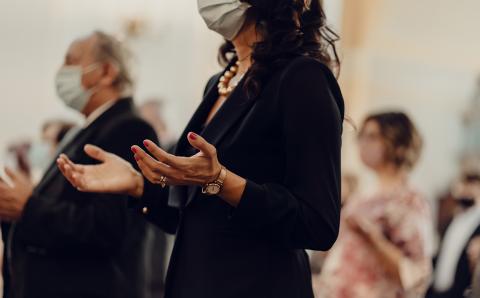She sat on a public bench on busy Cortez Avenue in Bradenton, Fla., surrounded by her earthly possessions, wrapped in a large plastic blue tarp.
One Sunday afternoon, my husband and I walked the short distance from our condo to the person on the bench, carrying some soup and banana bread. Our offer of soup was met with hesitant assent, but when the banana bread was mentioned, her eyes lit up and she eagerly accepted. Her name was Donna Jackson, and she told us she was choosing to live outside, waiting to save enough money from her social security checks to travel to New York City. She was easy to talk to and mentioned several places in the U.S. that she had visited. She asked our names and looked us in the eye when we spoke. There was a quiet dignity, stillness, and curiosity about her. She blessed us when we said goodbye.
A few days later, my husband offered her some pizza, but she politely refused. He talked to her briefly and then bid her a good day.
Donna worked her way into our minds. How did she stay warm when the temperature dropped into the 40s at night? How did she stay dry that night of strong winds and driving rains? Where did she go to the bathroom? Where did she shower? Judging by her appearance and odor, it probably didn’t happen often. She was in the same thick-knit, long-sleeved black shirt and long skirt every day.
For at least a month, every time we went by she was either sleeping under a blue tarp or sitting on it. If she was gone, the blue tarp covered her possessions in a mound.
Donna was still on our minds. What was motivating her to stay on that bench? How could we help her? Did she need or want help?
On Valentine’s Day, realizing she didn’t want food or need anything (except maybe a shower), I gathered an old Smithsonian magazine and a travel magazine, inserted a Valentine’s card, and laid the magazines and the red-enveloped card on top of the blue tarp. We hoped the wind and rain that evening didn’t ruin them.
We couldn’t get Donna out of our minds. Was she mentally ill? Why did she choose to live like that? How long would the city let her live on the public bench?
And then she was gone. The blue tarp was gone. All her belongings were gone. The bench was gone.
One week later, I drove down Cortez, and there was Donna! She was sitting on another bench, across the street from her old bench. I parked my car and walked over to Donna. She was sitting on her blue tarp in a thick brown shirt and long skirt. I re-introduced myself, and she seemed glad to see me. She told me they took the other bench away: “I don’t think they wanted me there anymore.” So she moved to this bench directly across the street. She showed me something she was typing on her small device. It was the Lord’s Prayer. She was writing each sentence of the Lord’s Prayer and describing its meaning. For example: “‘Our Father, who art in Heaven’—this gives the location of where God is.”
I told her my favorite sentence in the Lord’s Prayer: “Thy kingdom come, on earth as it is in heaven.” We talked about God’s kingdom on earth, and she started quoting verses from Matthew 25: “For I was hungry and you gave me something to eat, I was thirsty and you gave me something to drink, I was a stranger and you invited me in, I needed clothes and you clothed me.” She reflected on how we can do that for others. I finally said, “You don’t think of yourself as someone who needs food or drink or is homeless, do you?” And she said, “No.”
I was dumbfounded. This was the same chapter that our church had chosen for our Lenten devotions. We were studying “Becoming a Beloved Community: A Matthew 25 Journey to the Cross.” I had been praying for God to open my eyes.
We began talking about cultures and sociology. She had traveled to Africa and was amazed how heterogenous its nations are. She described the U.S. as being homogenous. I said, “But the U.S. is very heterogeneous—it’s a melting pot of all different kinds of people.” “Yes,” she said, “but in the U.S. we try to make everyone look and think the same rather than encouraging and celebrating our uniqueness.” During the course of the conversation, it became obvious that she had studied and worked in several different places throughout the world.
At the close of the conversation, I asked how I could pray for her and if she would pray for me. She asked for calmness and peace and said she would pray for me.
A week later, we stopped again to chat. She was sitting in the warm sun on her blue tarp in her brown outfit, knitting scarves. She said she buys the yarn at the Hobby Lobby across the street and will either sell them or give them away. Her plan was to “get off this bench” and travel to New York City and Virginia, where she has family. I encouraged her to get off the bench just to get some exercise! She didn’t seem to take offense. At this point we were comfortable acquaintances. She talked more about her travels and jobs, and then we said goodbye and went back to our car.
And then Donna was gone. The blue tarp was gone. Her belongings were gone. The bench was still there.
Donna is still on our minds. Where is she? Did she save enough money to travel to New York or Virginia? Could she find transportation? Is she safe from COVID-19?
Then I began thinking about myself. At the beginning of this encounter, I thought of myself as the “hands and feet of Jesus”—someone who is privileged and blessed giving out of my bounty to someone less fortunate. Then I reflected on Matthew 25: “And Jesus said, ‘I tell you the truth, whatever you did for one of the least of these brothers (and sisters) of mine, you did for me.’” Was Donna … Jesus? Instead of me being like Jesus, was Donna the one really being like Jesus? Was Jesus being like Donna? Jesus so closely identifies with the sufferer. Who is the sufferer—Donna or me? Who was more blessed—Donna or me?
This is what I know:
- Donna seemed happy.
- Donna was unencumbered by possessions.
- Donna loved Jesus.
- Donna was a lifetime learner.
- Donna had dignity.
- Donna made unorthodox decisions.
This is what I’m learning:
- You never know unless you ask.
- Seek to understand before you judge.
- I am enriched by engaging with “the other.”
- God moves in mysterious ways and shows up in unexpected places.
I wonder how many more Donnas are out there. I’m thankful that God is opening my eyes, and I pray that he will help me to really see.
About the Author
Beth Rinsema lives in Muskegon, Mich., and spends time in Florida during winter. She ended her nursing career as a parish nurse at Elmhurst Christian Reformed Church. She attends Bethany CRC in Muskegon and Peace Presbyterian Church in Florida.








